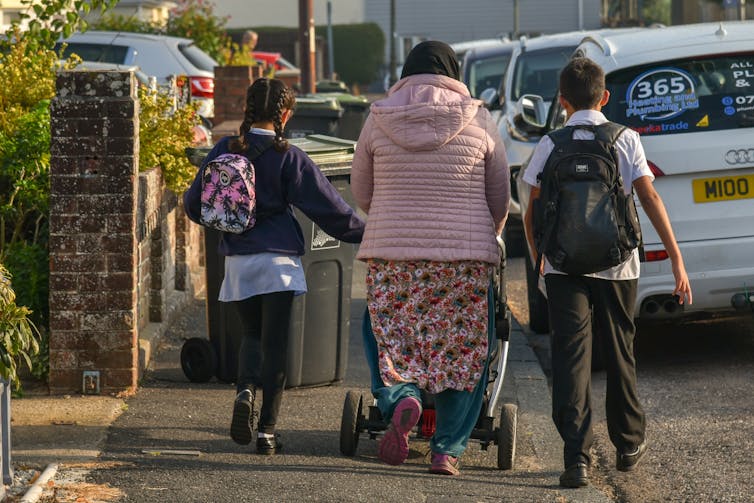UK chancellor Rachel Reeves has made some significant reforms in her latest budget. Notably, she has committed to easing living cost pressures with widespread energy bill support, higher taxes for the most expensive homes, and axing the two-child cap on certain benefits.
In a speech to Labour MPs a couple of days before the announcement, she made clear that her tax and spend decisions were a package and not a “pick-and-mix” from which backbenchers could choose the measures they liked. While Reeves will no doubt face further opposition, it may be that many of the things she has announced largely align with what Labour backbenchers had been hoping to hear.
Here’s what our panel of experts made of her plans.
Help with energy bills in a bid to tame inflation
Andrew Burlinson, Lecturer in Economics, University of Sheffield
Typical household energy bills (at £1,725 per year) remain more than £450 higher than pre-crisis levels. Reeves is therefore pledging to “grip the cost of living” with a package of short- and long-term solutions.
Instead of axing the 5% VAT paid on energy bills, as had been widely trailed, Reeves has removed certain social and environmental levies from electricity bills, which she says will save households up to £150. These levies funded government policies supporting vulnerable people and low-carbon technology adoption, which will now be paid for through general taxation.
This is a welcome progressive shift. Sharing these costs across all households disproportionately hurt people on lower incomes who paid the same percentage in levies as wealthier customers. What’s more, while these levies represent a relatively small chunk of people’s bills (about 16%) compared to wholesale costs, removing them will help bring down energy-related inflation.

The chancellor is also rightly extending the warm homes discount scheme, which takes an additional £150 off some people’s electricity bills and which will now reach six million households. Yet the temporary discount does not reverse a decade of low, even substandard, government-backed energy-efficiency schemes.
However, the warm homes plan, which aims to improve energy efficiency in homes, will now receive an extra £1.5 billion to tackle fuel poverty. Done properly, investment in energy efficiency and low-carbon technologies can cut bills, improve people’s health and reduce emissions – a “win-win-win”.
Read more: What will the budget mean for economic growth? Experts give their view
Freezing thresholds will leave millions with higher tax bills
Linda Yueh, Fellow in Economics, University of Oxford
The chancellor announced a plethora of novel taxes alongside more established duties to raise enough revenue to allow her to meet her fiscal rules. Not raising income taxes, national insurance or VAT in order to fulfil a manifesto pledge leaves only around one quarter of the tax take for her to draw on.
The “stealth” tax that will certainly raise revenue is the extension of a freeze in personal thresholds, which could raise more than £12 billion by 2030-31. Known as “fiscal drag”, millions more taxpayers will move into higher income tax brackets as their pay rises because the thresholds at which they pay more tax will not increase with inflation.
There’s also a levy per mile on electric vehicles (EVs), which will require owners to assess their own annual mileage. Road taxes do generate revenue. For example, a 3p‑per‑mile charge starting around 2028 would raise £1.4 billion per year by about 2031. But this depends on the number of EVs increasing from roughly 1.3 million cars to around 5 million to 6 million, with typical private annual mileages of 8,000–10,000 miles.
The chancellor’s fiscal rule of meeting current spending through taxation has led to a smorgasbord of taxes. As some of these are novel, it remains to be seen whether they will also create unintended consequences.
Read more: Electric vehicle owners face new pay-per-mile tax – what could be the environmental costs?
A ‘mansion tax’ for the most expensive properties
Alper Kara, Professor of Banking and Finance, Brunel University of London
The government announced a new council tax surcharge on the most expensive properties in England and Wales from April 2028. The “mansion tax” will be levied annually, costing £2,500 for properties worth more than £2 million and £7,500 for those worth over £5 million.
Around 145,000 homes will be affected, mostly in London and south-east England. The value of those properties will probably go down a little.

But more broadly, the measure – which it is claimed will raise £400 million by 2031 – risks adding further complexity to the council tax system without resolving long-standing weaknesses such as its out-dated and unfair valuations.
And while the mansion tax targets wealthier homeowners, the actual revenue earned may end up being lower than planned due to things like “price bunching”, where buyers and sellers keep valuations just below the bands, distorting the market. There might also be a decline in high-value property sales which would reduce stamp duty revenue for the Treasury.
A further measure with implications for housing is the 2% rise in tax on property income, which will cut landlords’ profits and may persuade some to leave the market. This in turn could easily reduce the supply of rental homes available, potentially increasing rents where demand is high. It may also limit investment in maintenance and improvements, leading to a decline in the quality of rental accommodation.
An end to the two-child benefit cap but more anti-poverty measures needed
Ruth Patrick, Professor in Social and Public Policy, University of Glasgow
Scrapping the two-child limit is an incredibly welcome reform that starts the urgent work needed to drive down what remain high levels of child poverty. Four-and-a-half million children in the UK faced poverty in 2022-23, and too many will still face hardship without further investment and reform from this government.
At this year’s Labour conference, Prime Minister Keir Starmer ambitiously pledged that he wanted his government to end child poverty. To realise this, he will need to usher in change on a much greater scale than has been announced.
The two-child limit was an ill-designed and arguably cruel policy which assigned children to poverty simply (and only) because of the number of siblings they had. The charity Child Poverty Action Group estimates that 109 children each day are born into households affected by the cap, purely because they have two or more elder siblings.

Removing the two-child limit restores the historic link between need and entitlement to support, which the policy had eroded. But the same problem remains for the wider benefit cap, which limits the amount of social security people can receive and currently leaves many subsisting far below the poverty line.
Any day now we will see the publication of a UK-wide child poverty strategy – the first in almost a decade. My hope is that this builds on the chancellor’s announcements, and points to a future where all children can be protected from poverty.
Gambling reforms seek to mitigate misery – but bingo exemption could backfire
Christopher Bunn, Professor of Applied Sociology, University of Glasgow & Gerda Reith, Professor of Social Sciences, University of Glasgow
As experts in gambling-related harm, we welcome the principle behind these moves, which will increase tax on remote gaming from 21% to 40% and on online betting from 15% to 25%. These changes are hoped to raise £1.1 billion by 2029-30. Tax increases on harmful products are an important tool for reducing consumption and mitigating harm.
Online gaming, particularly casino- and slot-style games, is associated with high levels of risk, and the substantial increase in remote gaming duty reflects this evidence.
However, this logic – taxing harm – could have been applied more consistently. Other gambling products with strong evidence of harm, such as electronic gaming machines in adult gaming centres, remain outside the scope.
This creates a policy gap that risks undermining the public health objectives. And it is a missed opportunity to address the impact on relationships, families and mental and emotional wellbeing experienced by more than a million people in Britain.
While evidence suggests that bingo is generally low-harm, the abolition of bingo duty raises concerns. Bingo clubs and their operators generate substantial profits from electronic gambling machines in their premises.
There is a chance that operators may use this tax break to promote the harmful machine-based products within their venues. Unfortunately, these carry significantly higher risks of addiction. Without safeguards, this unintended consequence could offset the benefits of other reforms.
Andrew Burlinson previously received funding from UKERC (UKRI) and relevant funding from EPSRC.
Christopher Bunn receives grant funding for gambling-related projects from The British Academy, The Economic and Social Research Council, the National Institute of Health Research, Blackburn with Darwen Local Authority, and the Department of Culture Media and Sport..
Gerda Reith has received funding from National Institute for Health Research: Economic and Social Research Council, British Academy, Medical Research Council.
Ruth Patrick is a member of the Labour Party.
Alper Kara does not work for, consult, own shares in or receive funding from any company or organisation that would benefit from this article, and has disclosed no relevant affiliations beyond their academic appointment.
This article was originally published on The Conversation. Read the original article.







